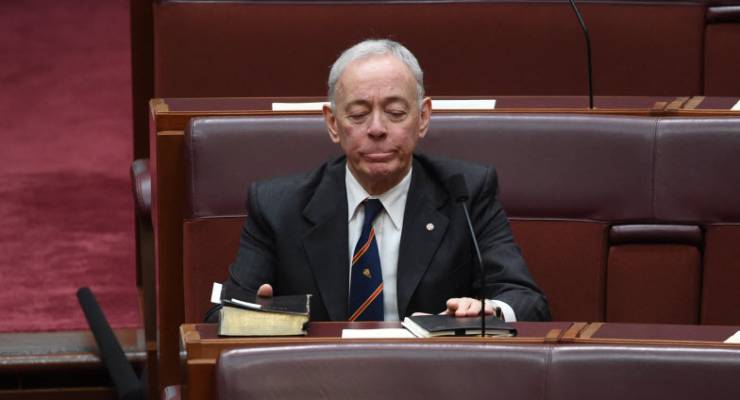
When did Malcolm Turnbull become aware there was a serious question about the constitutionality of Family First senator Bob Day’s Senate position? And how long after the government learnt of the issue did the Special Minister of State decide to advise the Senate president?
Clearly officials have been concerned about the problem of Day’s financial relationship with the Commonwealth for some time. One of Day’s companies sold the building in which the Commonwealth was renting space for his electorate office in 2014, to a $2 company owned by an employee. Day himself went guarantor for the loan to the new owner, meaning despite selling the building, he had a financial interest in the Commonwealth continuing to rent space there. Someone within the Department of Finance — that’s the portfolio responsible both for providing facilities to MPs and senators and the Special Minister of State function responsible for the electoral matters — must have twigged to that, because we’ve now learnt no rent has been paid for the lease since December.
Then, following the election, Day complained about the lack of rent, which apparently seems to have been the prompt for new Special Minister of State Scott Ryan to start asking questions about the arrangement. The lease was terminated a month ago. Last Friday, Ryan and Attorney-General George Brandis jointly wrote to Senate president Stephen Parry about the matter.
Based on this timeline, it’s seems plausible, even likely, that Scott Ryan acted appropriately and with due expedition on the matter of whether Day was eligible. What’s more problematic is the period between when rent was halted in 2o15 and when Day, in retrospect unwisely, raised the matter of the unpaid rent in August, prompting Ryan to investigate. Mathias Cormann was Special Minister of State for most of that period, after Mal Brough stood aside just before New Year. Was he alerted by officials to the issue of Day’s eligibility? Did he seek advice, or raise it with the PM?
Day insists there’s nothing untoward in any of this, and the High Court, to which the matter will be referred, may agree. But the longer the government knew there was an issue about Day without taking action, the worse this will look. It’s in no way the government’s fault that Day may have been ineligible for election, but the fact that Day, a former Liberal who only moved to Family First because he couldn’t get elected as a Liberal, is a reliable Coalition vote makes any tardiness look self-serving.
It’s also a perfect illustration of why George Brandis’ attempt to restrict access to Solicitor-General Justin Gleeson was terrible public policy. The advice sought by the Australian Government Solicitor from Gleeson on a matter relating to “the composition of the Senate” — something revealed en passant by the Solicitor-General to the Senate inquiry into the attempt by the Attorney-General to restrict access to him — doesn’t appear to have been about Day, contrary to much speculation. But it very easily could have been; a request for advice from another portfolio on the eligibility of a senator on whom the government was relying should not be subject to the veto of the government’s senate leader, who might take a dim view of losing a reliable vote in such a tight Senate.
This is the second time a Senate election screw-up has cruelled the Coalition: the Australian Electoral Commission botched the WA Senate election in 2013, forcing a rerun in that state that meant the Abbott government in effect went back to the polls just six months after being elected. Now, there’s Bob Day and the possibility that the government will lose a reliable vote in the Senate for an unknown quantity — One Nation, Labor, someone else. Again, not the Coalition’s fault — magically, not even the fault of George Brandis, who botches everything he touches — but they’ll wear the consequences.
Meantime Day has left the Senate — properly, this time, after his will-he-won’t-he act of last week. It’s not a major problem for the government because even though he was a reliable vote, his departure reduces the majority the government needs, so it comes out pretty much square. The imbroglio about his eligibility won’t be resolved quickly, and Parliament packs up for the year at the end of the month anyway. That suits the government, which is keen to bring the ABCC bill to a vote before the end of the year. But next year may bring a more difficult Senate if Family First loses its Senate spot. And it does nothing to dispel the sense of chaos that pervades this government.








Another question to be answered is whether Tony Abbott also complied with S44 of the Australian Constitution and duly revoked his UK citizenship…PRIOR….to him being elected in 1994??
Julia Gillard had to prove her compliance. Why has´nt Tony Abbott?
FOI requests have been made:
http://tonymagrathea.blogspot.com.au/2015/08/australian-electoral-commission-and.html
Why is this not gaining the same attention as Day´s constitutional compliance?
A government wed to your constancy; owning a building, renting it to the Commonwealth (at whatever cost, decided by whom) so that they can provide you with an office, at tax-payer expense? …. Nice work if you can get it?
And what of members that use their accommodation allowance to rent their wife’s house in ACT? Are their finances really separate?
Bob Day has long been a dodgy builder so it’s hardly surprising that he is a dodgy pollie.
Now the government is after Culleton? …. A distraction from what?
The fact that Culleton was unlikely to support it over the ABCC? He has expressed a couple of personal views that differ from Hanson’s – although after his amazing presser today his speech is not always clear.